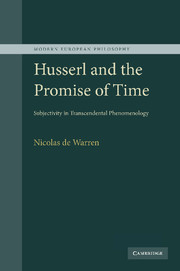Book contents
- Frontmatter
- Contents
- Acknowledgments
- List of abbreviations
- Introduction: the promise of time: subjectivity in Husserl's transcendental phenomenology
- 1 The ritual of clarification
- 2 A rehearsal of difficulties
- 3 The ghosts of Brentano
- 4 The retention of time past
- 5 The impossible puzzle
- 6 The lives of Others
- 7 The life of consciousness
- Appendix: note on textual sources
- Bibliography
- Index
7 - The life of consciousness
Published online by Cambridge University Press: 20 January 2010
- Frontmatter
- Contents
- Acknowledgments
- List of abbreviations
- Introduction: the promise of time: subjectivity in Husserl's transcendental phenomenology
- 1 The ritual of clarification
- 2 A rehearsal of difficulties
- 3 The ghosts of Brentano
- 4 The retention of time past
- 5 The impossible puzzle
- 6 The lives of Others
- 7 The life of consciousness
- Appendix: note on textual sources
- Bibliography
- Index
Summary
An authentic analysis of consciousness is, so to speak, a hermeneutics of the life of consciousness.
— HusserlTime and genesis
The transcendental constitution of the Other, as discussed in chapter 6, allows us to motivate the question of how to negotiate the relationship between the primordial transcendence of the Other and the primordial transcendence of original time-consciousness, on the basis of which transcendence as such – the transcendence of the world, including the lives of Others, and my own self-transcendence – is grounded. In both instances, time-consciousness is opened in a radical form of transcendence – the original transcendence within immanence within the retentional and protentional dimensions of my self-temporalization and the transcendence within the immanence of the Other, which, as suggested earlier, finds a promising phenomenological comparison with the intersection of far retention and far protention, bereft, however, of a living present. The Other's proper name, or, in other words, her sphere of ownmost, forever remains on the tip of my tongue, beyond the arc of my living present, as given in an empty consciousness of far retention predicated on the impossibility of fulfillment in an equally distant far protention. As we further explored in chapter 6, the phenomenological argument of transcendental idealism, cast in the form of a refutation of transcendental solipsism, critically depends on Husserl's analysis of time-consciousness and the constitution of the Other as an alter-ego.
- Type
- Chapter
- Information
- Husserl and the Promise of TimeSubjectivity in Transcendental Phenomenology, pp. 250 - 290Publisher: Cambridge University PressPrint publication year: 2009

